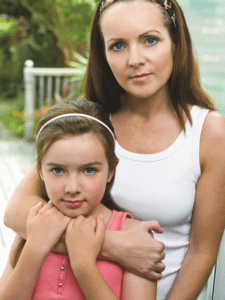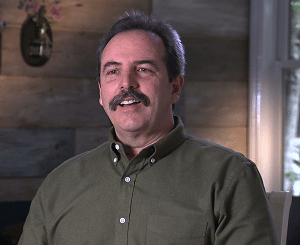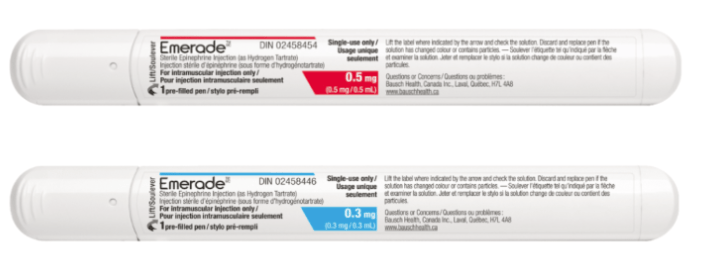
WHEN my daughter was diagnosed with multiple food allergies nine years ago, I could not have predicted the anxiety, guilt, and self-blame that I would experience as a mother. It was hard enough figuring out what to feed her, how to handle preschool, and how to use an epinephrine auto-injector.
Things became even harder when she was also diagnosed with celiac disease. But hardest of all, I see now, were the times that despite my vigilance, I made mistakes.
Having a child experience anaphylaxis is one of the most terrifying experiences a parent can face. But when you’re the one who made the mistake – when you served the cookie or cooked the dinner – the psychological aftermath is brutal.
Take, for example, the Milk Mix-Up. I will never forget the summer evening when my daughter (age 6) was playing with her younger brother in the backyard while my husband and I were cooking dinner. I brought two glasses outside – one filled with cow’s milk, the other with soy milk (since she’s allergic to milk) – and set them down on the patio table. Only the kids changed places when I went back inside. You can see where this ended: one long, harrowing evening in the ER.
The next day, my daughter bounded out of bed, feeling fine despite repeated shots of epinephrine, steroids, and a late night at the hospital. It was nothing short of miraculous. I, on the other hand, could barely move. I felt as though I’d been in a car wreck. For weeks afterward, the litany of self-recrimination in my head would not turn off.
Tough on Ourselves
Eventually I managed to move on, but the guilt and blame lay submerged under the surface, whispering voices telling me that I was a Bad Mother, until I finally wrote an essay about this incident for a book about mothering.
Suddenly, I started to have conversations with other food allergy parents (mostly moms) about mistakes they’d made. One mom confessed her guilt over what she ate when she was breastfeeding, which made her wonder whether she was to blame for her tween daughter’s extensive allergies and eczema; another woman blamed herself for signing her son up for an oral immunotherapy trial, which she now worries may have contributed to the development of EOE, the troublesome allergic condition of the esophagus.
A close friend confided that she’d never been able to understand how I could have mixed up the milk, until she did the exact same thing herself.
I read truth-telling threads in Facebook groups and confessions on blogs, including one post titled “The time I almost killed my child,” that left me teary-eyed and shaken. The blogger’s crime? She’d read the ingredients on only one of two cookie boxes. Same brand, same cookie. Different flavors.
Another friend with a daughter with a peanut allergy summed it all up. “I can be so forgiving of others,” she said. “But I’m so hard on myself If I do one thing wrong and 10,000 things right, I focus on that one thing. Somehow I can’t give myself the same grace that I can give to any other mom.”
Here’s the thing: No matter how careful we are, no matter how many times we read labels and call food companies and obsess over trying to control our child’s environment, we’re all human. We’re going to make mistakes. So why is it so hard to forgive ourselves?
Studies of Mom Stress
Food allergies are particularly hard for families. Mistakes can be deadly. Trying to avoid food allergens is often stressful, simply because the stakes are so high (not to mention the frustrations of navigating a sea of “may contain” statements on food labels). Plus, food is both intimate and deeply social.
Research corroborates what many of us already know: a child’s food allergies frequently negatively impact the mental and emotional health of parents. A couple of studies suggest that moms may bear the brunt of the added stress.
In 2005, Canadian researchers studying peanut-allergic children with anaphylaxis found that mothers bore the primary responsibility for managing a child’s food allergy and felt inadequately supported for doing so. A slightly larger 2009 study in the U.K. found that mothers of food-allergic children had a poorer quality of life as well as higher levels of anxiety and stress than fathers.
Similarly, researchers in Chicago who conducted a web-based survey among parents of food-allergic children found that more than half of the respondents (most of whom were mothers) felt that they worried more than their partner about their child’s food allergy.
My own interviews with dozens of mothers of food-allergic kids support these findings. Stories about stress, guilt, and blame frequently come up. On one level, this isn’t surprising. Mothers still spend more time with their children than fathers – nearly twice as much in the U.S., according to the 2012 American Time Use Survey – and more than twice as much time on food preparation and cleanup.
When you spend more time with the kids and do more of the cooking, you’re the one who’s more likely to make a mistake, witness an allergic reaction, and feel enormous guilt about it afterwards. But I wonder if something else is at work as well. As a women’s and gender studies professor, I have to ask: Does the impact of food allergies on mothers have anything to do with the way our culture understands motherhood?
Acute Case of Mother Blame

Heather Hewett and her children at home in the lower Hudson Valley, NY.
Take, for example, our tendency to blame mothers, which stretches back (at least) to Freud. Consider the 1950s, when doctors and psychologists pointed the finger at mothers when their children were diagnosed with schizophrenia and autism. We know better now, of course, because of scientific developments in our understanding of neuroscience and genetics, but mother blame hasn’t gone away.
In my interviews with mothers of food-allergic kids, I’ve realized that I’m not the only one who finds myself searching for my own culpability. Did I eat too many peanut butter cookies during pregnancy, or did I wait too long to introduce particular foods? Maybe my daughter wasn’t exposed to enough germs and dirt when we lived in New York City? The list is endless.
If I had to give myself a diagnosis, I’d say that I suffer from a particularly acute case of mother blame. I believe I’ve absorbed this habit from the culture I live in. It’s a predisposition that reveals a larger issue: a distorted view of motherhood more generally.
Our culture has always idealized motherhood. The glorification of the perfect, self-denying “Angel in the House” may have reached its apotheosis during the Victorian era, but she lingers in the air. Media stories about celebrity moms, “Fakebook” status updates, and parenting magazines continue to reinforce unrealistic images of motherhood. Some call this the myth of the Good Mother.
Good Mother, Bad Mother Myths
I’ve come to realize that many food allergy moms (myself included) are simultaneously caught up in a quest to be a fearless Warrior Mom. Like the parents of other special needs kids, we frequently fight on behalf of our children. In fact, some of us go to extraordinary lengths to keep our kids safe: we read labels with scrutiny, double-check with manufacturers, cook from scratch, think through every detail of our children’s lives, keep up with medical research, and advocate for them at school (and in the halls of our legislatures).
The very goal of food allergen avoidance requires a heightened vigilance; the safety of our kids depends on it. But is this expectation – absolute control over our children’s environment – realistically attainable all of the time?
We also need to turn a critical eye on the Good Mother’s doppelganger, the Bad Mother. This evil twin lurks in the shadows with her own monstrous mythology, defined by negligent and abusive mothering that no child should experience. Without question, any parent who harms his or her child should be held accountable. Parents can inflict lasting damage on their kids.
Yet our vilification of the Bad Mother – just like our idealization of her counterpart – reveals something else. Neither of these symbols is actually human. Rather, they’re mirror images of the same all-powerful Mother.
The truth is, most mothers fall somewhere in between: neither monstrous nor perfect, and (alas) far from omnipotent. We’re simply human.
‘Good Enough’ Mother
Pediatrician-turned-psychoanalyst D.W. Winnicott first introduced the idea of the “good enough” mother in 1953. While he drew his conclusion from observing mothers with their infants, his observations resonate for parenting more broadly. He wrote that children need to learn that “a mother is neither good nor bad nor the product of illusion, but is a separate and independent entity.”
Whereas a mother initially attends to her infant’s every need, as time goes on, “she adapts less and less completely, gradually, according to the infant’s growing ability to deal with her failure.”
Winnicott believed that it was not a mother’s job to be perfect; to the contrary, a caregiver who immediately met a child’s every need might eventually hinder the child’s own development.
The concept of good enough mothering invites us to resist cultural ideals of perfection. It suggests a more realistic model that balances loving attention with honesty about our own limitations. Although it’s not easy, I’ve tried to let go of excessive self-blame and to focus instead on learning from my mistakes. (The day after the Milk Mix-Up, my husband and I purchased two sets of differently colored glasses so this confusion would never, ever happen again.)
Food allergies deserve my respect and vigilance, but the emotions that I’ve attached to them – fear and blame – cloud my ability to think and act with clarity. While I can’t stop experiencing these feelings, they don’t have to dominate my relationship with my kids.
Equally important for mothers, I think, is asking others to step up to the daily work of food allergy management. If we recognize our limits as individuals, then we need a village. Everyone needs to do his or her part: our spouses and partners, extended families, friends, teachers, paid caregivers, and – as they grow and assume responsibility for their allergies – our kids.
At the same time, the medical community needs to pay far more attention to the emotional and psychological well-being of the entire family unit, especially mothers and other primary caregivers. (Sarah Boudreau-Romano has written some excellent recommendations in Allergic Living.) We can find additional help by turning to counselors, therapists, and support groups.
Most of all, we can share our stories with each other. Truth-telling can provide an antidote to cultural myths and serve as a powerful connector. I’ve been touched by the stories that I’ve been told and the ones I’ve read. I’m inspired by the courage of parents willing to share their mistakes and speak openly about the messiness of their lives.
I learn something every time I witness someone else’s humanity. I cannot help but think that this is the starting place of compassion and forgiveness, and maybe even for healing. And not just for moms. For all of us.
Heather Hewett, PhD, is a writer and professor at The State University of New York at New Paltz. She has written on food allergies for The New York Times Motherlode blog, CNN.com, and the anthology The Good Mother Myth: Redefining Motherhood to Fit Reality Her website is www.Heatherhewett.com.
Related Reading: Allergist Mom: What My Food-Allergic Kids Taught Me





